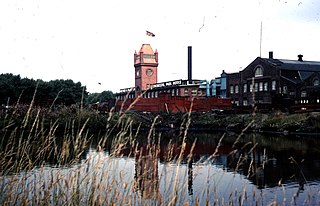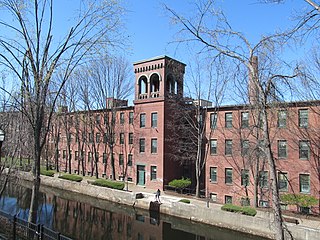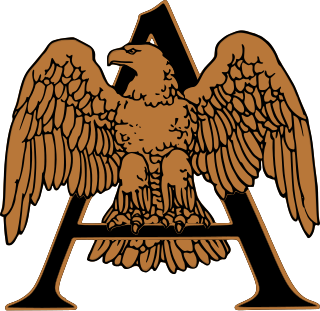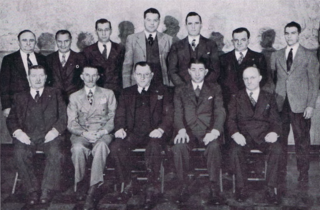
Holyoke is a city in Hampden County, Massachusetts, United States, that lies between the western bank of the Connecticut River and the Mount Tom Range. As of the 2020 census, the city had a population of 38,247. Located 8 miles (13 km) north of Springfield, Holyoke is part of the Springfield Metropolitan Area, one of the two distinct metropolitan areas in Massachusetts.

The pulp and paper industry comprises companies that use wood, specifically pulpwood, as raw material and produce pulp, paper, paperboard, and other cellulose-based products.

A paper mill is a factory devoted to making paper from vegetable fibres such as wood pulp, old rags, and other ingredients. Prior to the invention and adoption of the Fourdrinier machine and other types of paper machine that use an endless belt, all paper in a paper mill was made by hand, one sheet at a time, by specialized laborers.

Allis-Chalmers was a U.S. manufacturer of machinery for various industries. Its business lines included agricultural equipment, construction equipment, power generation and power transmission equipment, and machinery for use in industrial settings such as factories, flour mills, sawmills, textile mills, steel mills, refineries, mines, and ore mills.

The Holyoke Canal System is a system of power canals in Holyoke, Massachusetts. It is split into three canals based on elevation and distance from the inlet at the Holyoke Dam- the First Level Canal, Second Level Canal, and Third Level Canal. Constructed over a period between 1847 and 1892, the Canal System, along with the Dam, is recognized as a Historic Mechanical Engineering Landmark by the American Society of Mechanical Engineers for its use in the development of the Venturi meter by Clemens Herschel, the first means of measuring large-scale flows, and the McCormick-Holyoke Turbine by John B. McCormick, which doubled the efficiency of turbines to more than 80% in its time.

Andritz AG is an international technology group, offering plants, equipment, systems and services for various industries. The group's headquarters are in Graz, Austria. The group gets its name from the district of Andritz in which it is located and is listed on the Vienna Stock Exchange.

Mather & Platt is the name of several large engineering firms in Europe, South Africa and Asia that are subsidiaries of Wilo SE, Germany or were founded by former employees. The original company was founded in the Newton Heath area of Manchester, England, where it was a major employer. That firm continues as a food processing and packaging business, trading as M & P Engineering in Trafford Park, Manchester.

Ames Manufacturing Company was a manufacturer of swords, tools, and cutlery in Chicopee, Massachusetts, as well as an iron and bronze foundry. They were a significant provider of side arms, swords, light artillery, and heavy ordnance for the Union in the American Civil War. They also cast several bronze statues, which can be found throughout New England.

This article addresses the history of papermaking in Massachusetts.

The Worthington Corporation was a diversified American manufacturer that had its roots in Worthington and Baker, a steam pump manufacturer founded in 1845. In 1967 it merged with Studebaker and Wagner Electric to form Studebaker-Worthington. This company was in turn acquired by McGraw-Edison in 1979.

The machine industry or machinery industry is a subsector of the industry, that produces and maintains machines for consumers, the industry, and most other companies in the economy.

The Holyoke Dam, also referred to as the Hadley Falls Dam, or Hadley Falls Station is a granite dam built in tandem with the Holyoke Canal System at Hadley Falls on the Connecticut River, between Holyoke and South Hadley, Massachusetts. The water differential created by the dam produced mechanical hydropower for industrial uses in Holyoke, and later hydroelectric power.

Doing business as D. H. & A. B. Tower, brothers David Horatio Tower and Ashley Bemis Tower were internationally known American architects, civil and mechanical engineers based in Holyoke, Massachusetts, who designed mills and factories in the United States from Maine to California as well as abroad, including in Canada, Mexico, Germany, Brazil, the United Kingdom, India, China, Japan, and Australia. By the time of its dissolution, the firm was described by one contemporary account as "the largest firm of paper mill architects in the country at that time"; its files reportedly contained more than 8,000 architectural plans for sites, mill machinery, and waterpower improvements.

This is a bibliography of Holyoke, a city in Massachusetts, with books about the area's history, culture, geography, and people. Due to the area's proximity to a number of industrial developments and the numerous cultures of different waves of immigrant workers, a wide number of books, dissertations, and comprehensive articles have been written about Holyoke throughout its history in several languages. This list is not intended to be complete, authoritative, or exhaustive and does not include promotional material, travel guides, recipe books, directories, or the catalogs of industrial companies that have resided therein.

The American Writing Paper Company was an American pulp and paper producing company trust, primarily manufacturing printing and writing paper. Incorporated in New Jersey in 1899 and representing the merging of 23 rag paper mills, the company held its general offices in Holyoke, Massachusetts which was also the location of 13 of these mills. At its peak output American Writing Paper produced 75% of all fine papers in the United States; contemporary accounts describe it as the largest producer of fine papers in the world.

Despite representing a significantly smaller population than their Irish, French, Polish, or Puerto Rican counterparts, in the late 19th century through the mid-20th century, German immigrants predominantly from Saxony and Rhineland played a significant economic, cultural, and political role in the history of Holyoke, Massachusetts. The influx of these immigrants can largely be attributed to a single mill and millworker complex, the Germania Woolen Mills, which formed the basis of the immigrant colony that would make the ward encompassing the South Holyoke neighborhood that with the highest German population per capita, in all of New England by 1875. Along with unionization efforts by the Irish community, Germans would also play a key role in the city and region's socialist labor movements as workers organized for higher pay and improved living conditions in the textile and paper mill economies.
This is a timeline of the history of the city of Holyoke, Massachusetts, USA.

The Holyoke Testing Flume was a hydraulic testing laboratory and apparatus in Holyoke, Massachusetts, operated by the Holyoke Water Power Company from 1870 to 1932, and used to test the performance of water turbine designs, completing 3,176 tests of efficiency in that time. It was described by Robert E. Horton in court testimony as the only facility of its kind in the 19th and early 20th century, which made possible the standardization of American water turbines. Indeed Clemens Herschel, who managed and redesigned the facility in the 1880s, later described it in Congressional testimony as the "first modern hydraulic laboratory" in the United States and the world. It was through Herschel's need to determine the water power consumption of different mills, and in this testing system that he would invent the Venturi meter, the first accurate means of measuring large-scale flows, which still retains widespread use in modern technology today.

James Mason Prentice was an American game designer and businessman who founded The Electric Game Company. At the age of 17 he invented a simple electric baseball game which went on to become his best-selling game, as well as the first board game of its kind to use electrical relays.


















